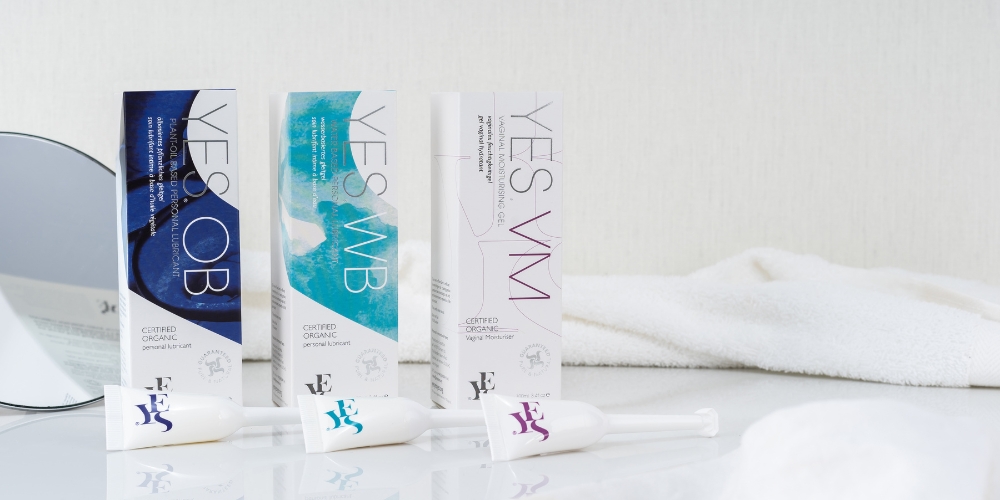
Fertility
Check your gynecologist-recommended lubricant for these 9 no-nos
Jessie Day | 7 Sep 2022
Gynecologist-recommended lubricants won’t contain these 9 things
Or at least, they shouldn’t. It’s thought that as much as 60% of what we put on our skin can then show up in our bloodstream, and we’d expect a gynecologist-recommended lubricant to be free from the ingredients covered below.
Why? Because many of them have the potential to irritate this most sensitive area of our bodies. They can also down-regulate fertility, have a negative effect on our hormonal balance, and much, much more. Some manufacturers don’t even declare full ingredient lists on their products. How gross is that?
It’s just not ok.
We picked up with YES: intimate health experts, and known as AH! YES in the USA, to talk which ingredients shouldn’t make it near a gynecologist-recommended lubricant. And, naturally, their YES WB/AH! YES WB water-based lube – is free from all of them.
For anyone asking, YES lube has been shown to have no adverse effect on sperm motility, making it an excellent, natural choice when trying to conceive (TTC). And we love that. One less thing to worry about.
Here are 9 lube ingredients to avoid (whether you’re TTC or not):
- Glycerin
- Grapefruit seed extract
- Parabens
- Propylene glycol
- Benzyl alcohol
- L-Arginine
- Petroleum bi-products (keep reading for what to look for)
- Benzocaine
- Silicone oils (keep reading for what to look for)

Glycerin (glycerine/glycerol)
Did you see the FDA alert for Diethylene glycol contamination, found in glycerin in 2022? Maybe not, but what if we told you that Diethylene glycol is a widely-used solvent, found in things like anti-freeze? We’d rather not go there.
YES/AH!YES avoid glycerin in their lube because:
- it’s a known mucus membrane irritant
- it can easily feed thrush/candida albicans
Glycerin is used to increase your lubricant’s osmolality (an important aspect of all things lube). YES®/AH!YES WB lube is the only lubricant that matches both natural vaginal pH and vaginal osmolality. Which makes it really safe, as well as super-exciting.
Note, glycerin is widely used in skincare, and can be very beneficial. But it’s an irritant for the mucosa (the moist inner lining of some organs and cavities in your body). The vagina is, ideally, moist, by nature. So we don’t want anything irritating near it/on it/around it.
Grapefruit seed extract (citrus seed extract/citrus grandis)
On the topic of irritants, watch out for grapefruit seed extract in your lube. Some products do include it, and this ingredient – while really beneficial in many supplements, remedies and products – has been shown in research to irritate certain mucosal areas.
Parabens
These synthetic preservatives are probably pretty familiar ‘to-avoid’ ingredients. Parabens (i.e methylparaben) mimic estrogen – making them a classic endocrine disruptor (definitely to be avoided) and have been linked to breast cancer.
The FDA investigation on parabens is ‘ongoing’, but for now, we’d rather not. And you really shouldn’t be seeing them in a gynecologist-recommended lubricant.
Propylene glycol
This is a solvent for ingredients within the lubricant, meaning it can pull other chemicals into the mucosa, which may not otherwise be there. But, it’s a petrochemical (yep), derived from petroleum, and more suited to things like antifreeze than your vagina, and sensuous sex.
Benzyl alcohol
Another preservative, and naturally-occurring solvent. Allergic reactions to benzyl alcohol are common, although it is largely marked as safe for use in skin products, but at higher concentration it can be an irritant for our mucous membranes. YES WB/AH! YES WB water-based lube doesn’t contain skin irritants.
L-Arginine
This amino acid has been known to trigger Herpes outbreaks (less than ideal), but many intimate health products do include it. Why? Because it’s said to intensify arousal, improving blood-flow to your vagina. We say, there are other ways. Other ways include Kegels (pelvic floor exercises), regular exercise (20 minutes a day will do it), and good hydration. Simple. And no Herpes.
Petroleum bi-products (make sure you know what to look for)
These can come in the form of:
- mineral oil (liquidum paraffinum)
- petrolatum (petroleum jelly)
- paraffin oil (lamp oil or premium kerosine)
- paraffin wax.
Lamp oil … just, no. Surely?
YES/AH! YES products will never (ever) contain any of these, and a gynecologist-recommended lubricant shouldn’t. They ‘coat’ our tissues, preventing normal functioning – we’ve all had a little tub of petroleum jelly knocking about as a super-thick (and sticky) lip balm, haven’t we? Plus, the EU has restricted petrolatum use in cosmetics, due to contamination concerns.
Benzocaine
Known for its numbing effects, benzocaine is used in some lubes to help with painful sex and anal play. But pain is never ok, during sex. If it hurts, you may be on your way to an injury. And if that’s the case, you need to stop, regroup and listen to your body.
And by the way, a quick search on this one will show lots of products which contain most of the to-avoid ingredients above.
Benzocaine. It doesn’t sound sexy, does it? Best avoid.
Silicone oils (again, know what to look for)
These can be listed as a a few things, like:
- dimethicone
- cyclomethicone
- dimethicone copolyol
Silicone is a hot topic right now because of its side effects when used in breast implants. Any hint of toxicity just doesn’t belong near your vagina. We’re sure you’ll agree.

20% off guaranteed pure and natural, plant-based and certified-organic lube (and a whole range of intimacy products)
Hopefully you’re clued up on what to avoid. When it comes to what to look for in your lube, we’d say, the simpler the better. YES/AH!YES are on a mission to Make Vaginas Happy® (speaking our language on every level). Their products include intimate moisturisers, lubes, washes, stimulants and more, all free from anything on the list above.
Instead, YES/AH!YES go for things like organic aloe vera, flax extract and natural gums for deep, velvety texture. Yes please.









